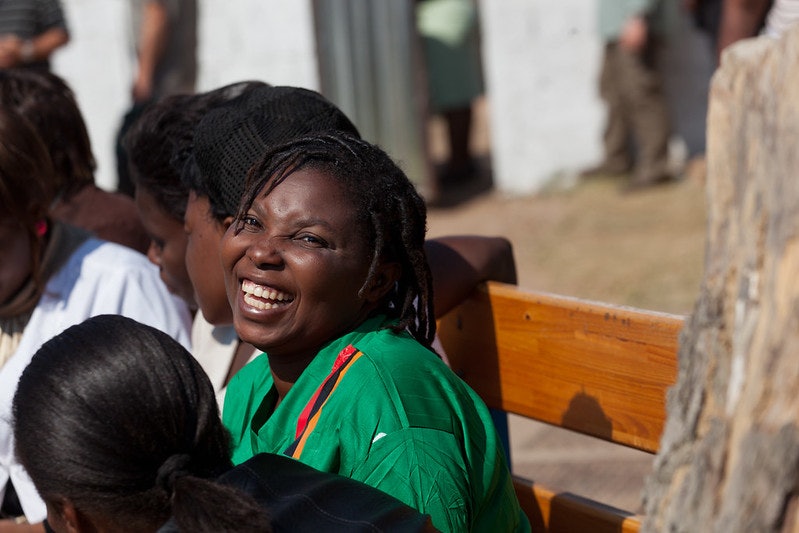The George W. Bush Institute submitted a statement to the House Foreign Affairs Subcommittee on Africa before a hearing on how the Chinese Communist Party is fueling regional conflict and exploiting metals, minerals, and mining. The statement included key recommendations on reprioritizing U.S. engagement in Africa, such as strengthening security and counterterrorism efforts, countering malign information from adversaries like China and Russia, and improving African communities’ well-being and economic growth opportunities through U.S. government initiatives including the President’s Emergency Plan for AIDS Relief (PEPFAR) and the Millenium Challenge Corporation (MCC).
Dear Chairman Smith, Ranking Member Jacobs, Members of the Committee:
On behalf of the George W. Bush Institute, thank you for convening this important hearing. We appreciate the opportunity to comment and to provide our recommendations.
A renewal of U.S. engagement and partnerships across Africa means a more secure America. Our elected leaders must prioritize the African continent as a top foreign policy focus. Our recommendations include:
- Strengthening security and counterterrorism efforts with African partners to deter common threats,
- Countering malign information from our adversaries, such as China and Russia, and
- Improving the well-being of African communities and economic growth opportunities through successful U.S. government initiatives, such as the President’s Emergency Plan for AIDS Relief (PEPFAR), Millenium Challenge Corporation (MCC), and others.
The African continent is at a crossroads and its future has direct implications on the state of peace and stability everywhere. Now more than ever, American leaders must urgently prioritize reengagement in Africa, especially in ways that advance opportunity, peace, and accountability.
Home to the world’s youngest and fastest-growing population, nearly 2.5 billion people will reside in Africa by 2050, most under 30. By midcentury, nearly a quarter of the world’s working age population will live in countries across Africa. When empowered, educated, engaged, and healthy, they represent an unparalleled force in accelerating progress for all, the United States included.
Accounting for more than half of the world’s 20 fastest growing economies, Africa touts entrepreneurship and innovation as driving solutions and growth. And with 65% of the world’s arable land and just under a third of the world’s mineral reserves, Africa’s economic significance is indisputable.
And yet American engagement across the continent has seen a steady decline over the last decade. Not surprisingly, adversarial influences – the CCP especially – have swiftly stepped into the vacuum.
While China’s growing footprint is notably seen across infrastructure projects and industries like the mining sector, the full scope of their influence throughout African countries warrants increased response, especially considering the concerning advancement of conflict and instability throughout the region.
In the last five years alone, communities across Africa have experienced unparalleled levels of political and economic crisis, with young Africans especially affected. Militant and extremist violence saw a 20% rise in 2023 alone and over 40 million Africans have been forcibly displaced – a figure that has doubled since 2016.
Opaque and often exploitative, China’s mining acquisitions and other investment have contributed to environmental destruction and widespread health concerns, corruption, and labor and human rights violations.
This has a destabilizing impact on local communities. But it is not the only nor the most significant contributor to rising instability across African countries.
Chinese loans – more than $182 billion since 2000 – exacerbate crippling debt burdens. Though some of these loans have contributed to development and infrastructure projects, China’s predatory lending has also meant that around 900 million Africans live in nations that contribute more resources to interest payments than essential services like education and health, as a recent New York Times analysis shows. Yet Chinese lending continues at its highest level since 2016.
Unsurprisingly, amid stagnated opportunity, unemployment rates continue to climb with more than 72 million African youth without jobs, access to education, or skills training. This has a direct impact on poverty, violent extremism, and mass migration.
Regular visits by high level CCP officials, highly publicized convenings (like the China-Africa Cooperation) and intergovernmental coordination via the BRICS partnership are regularly embraced by Beijing as a counterbalance to U.S. and European influence on the world order.
China has also made considerable plays for the hearts and minds of African communities. This includes major investments in the media and technology space, language programs, cultural centers, international youth forums, and a growing array of educational partnerships and scholarship opportunities.
Most concerning is the mounting interference from China and others (like Russia) on governance and security. This includes deals with dozens of African countries to train police and security forces, exporting alarming governance protocols that empower autocrats and other malign actors and directly violate personal freedoms and human rights.
These efforts have had notable implications for multilateral engagement (like United Nations votes) and perceptions of the United States on the continent. For example, China’s median approval rating outperformed the United States for the first time in 2023, at 58% according to Gallup’s annual World Leaders Poll. This equates to a six-percentage point climb in one year alone.
Africa matters. And the rights and well-being of populations across the continent have a direct impact on peace and prosperity everywhere. China and other malign actors have taken note and shrewdly acted in their interests.
The Millenium Challenge Corporation, the President’s Malaria Initiative, the Development Finance Corporation, PEPFAR, and the U.S. Africa Command are all proven and effective examples of U.S. involvement on the continent, and they warrant ongoing support.
We urge Congress and the Administration to ensure that American policy priorities and investments realign in response.





























